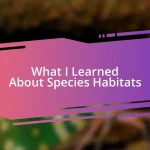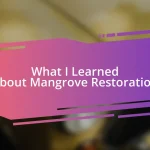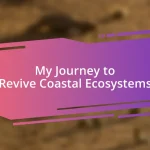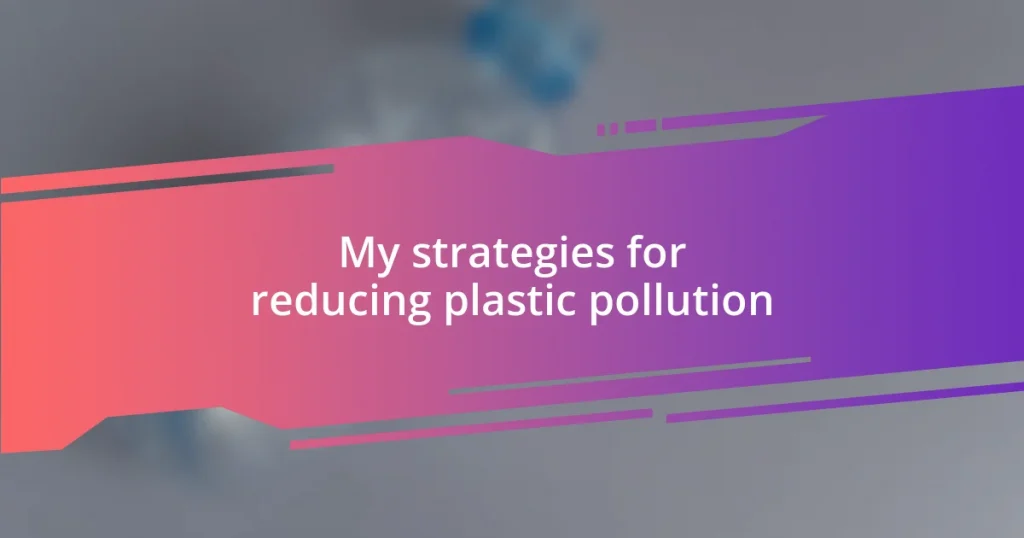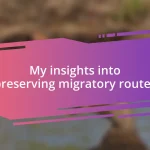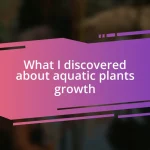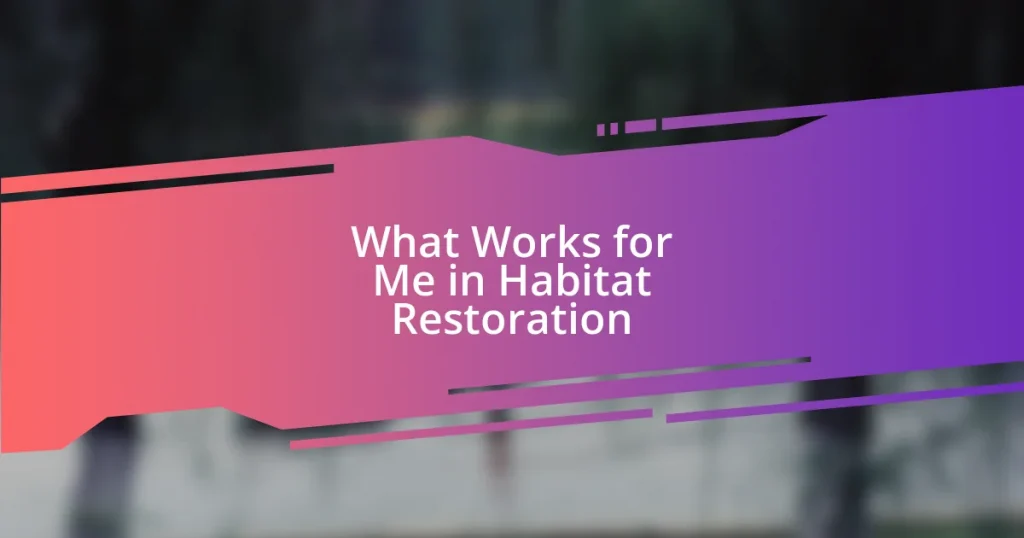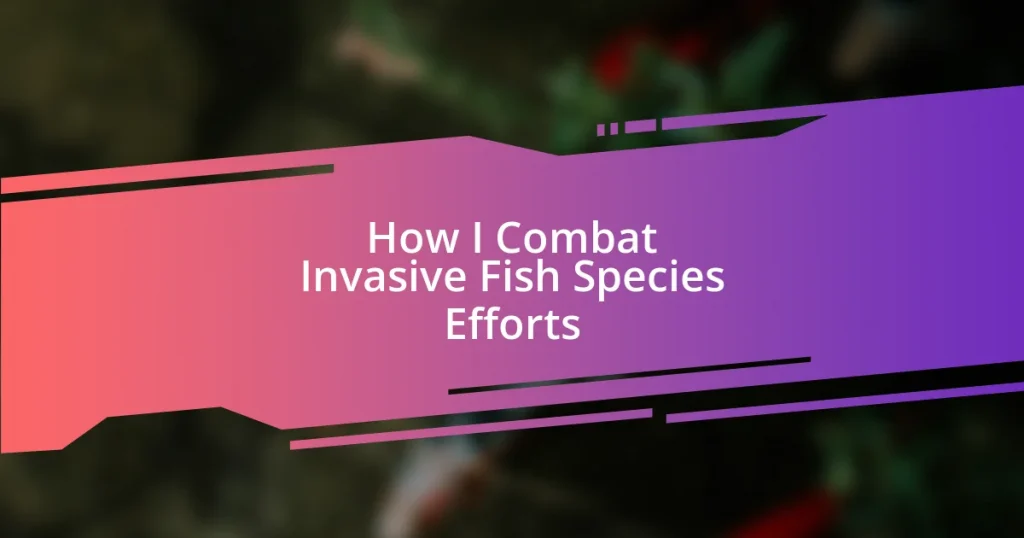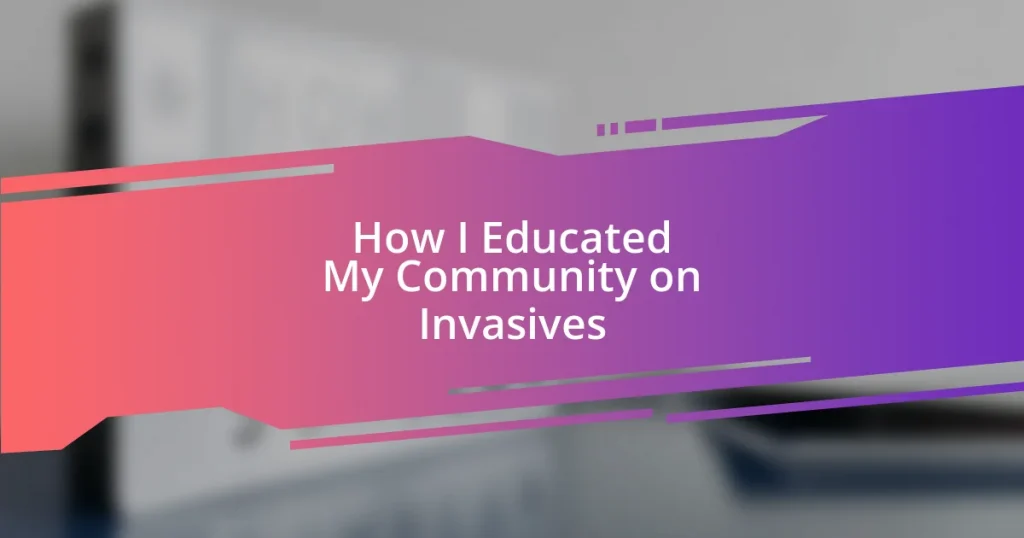Key takeaways:
- Personal habit changes, like using reusable bags and making homemade products, significantly reduce plastic waste.
- Engaging in community initiatives and advocating for policy changes amplify collective efforts to combat plastic pollution.
- Tracking progress and participating in challenges can enhance motivation and demonstrate measurable impact in reducing plastic usage.
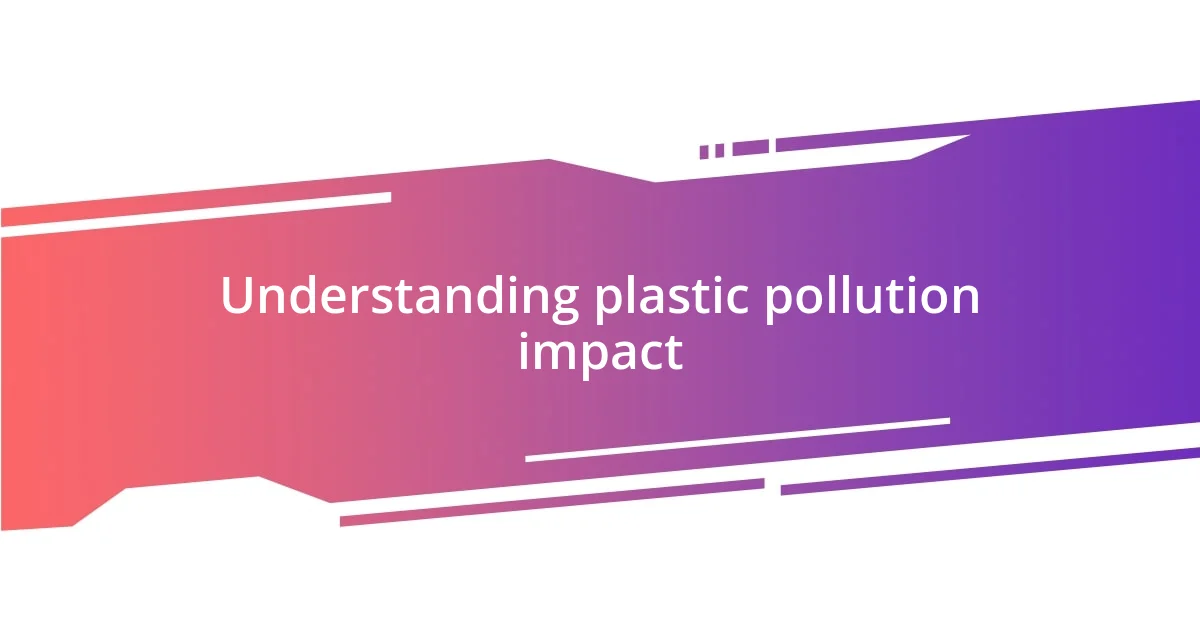
Understanding plastic pollution impact
Plastic pollution is a pervasive issue that affects every corner of our planet. I still remember visiting a beach where I used to spend summers as a child, only to find it strewn with plastic debris. It was heartbreaking to see a place I loved and cherished turn into a dumping ground. This made me question how we can allow such a beautiful environment to be tarnished in this way.
Think about the effects on marine life. One day, I stumbled upon a documentary showcasing sea turtles mistaking plastic bags for jellyfish. It struck me deeply; these creatures, so innocent and majestic, were suffering because of our habits. The emotional weight of seeing animals in distress over something we often overlook brings the harsh reality of plastic pollution closer to home. Are our everyday choices contributing to this problem?
Plastic waste doesn’t just vanish; it breaks down into microplastics that infiltrate our food chain. I recall a recent study revealing that humans consume an average of 5 grams of plastic each week—equivalent to a credit card! This shocking fact left me pondering my own choices. How many times do we opt for convenience over sustainability? Understanding the impact of plastic pollution on our health and ecosystems is crucial. It’s a conversation we must all engage in for the future of our planet.
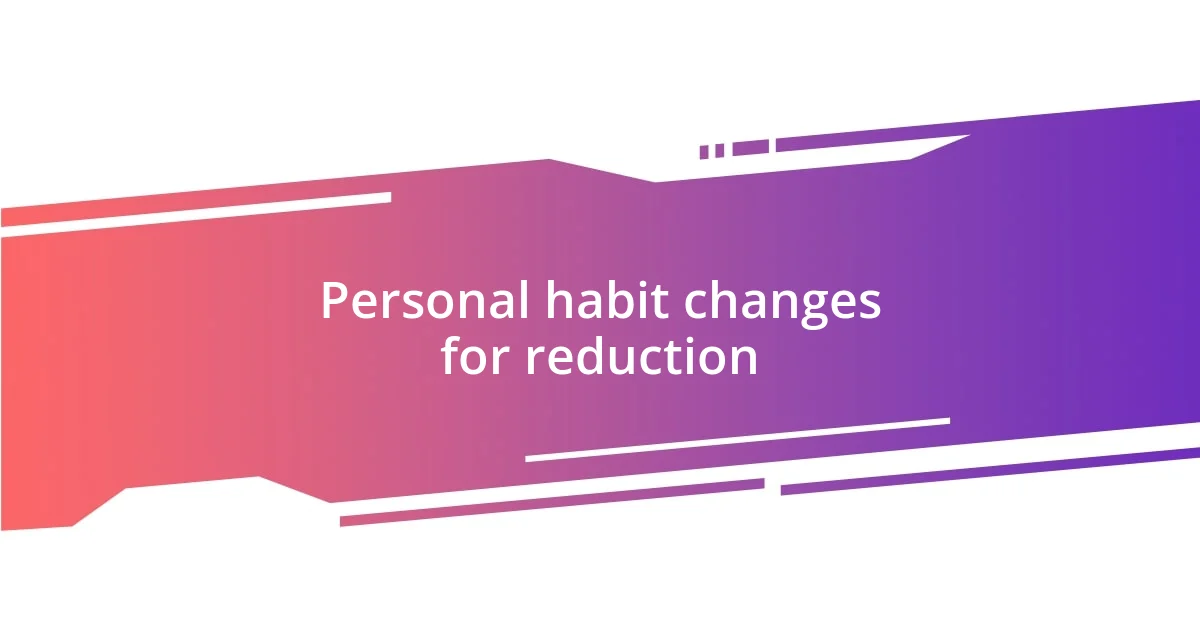
Personal habit changes for reduction
Reducing plastic pollution starts at home with personal habits that can significantly make a difference. For instance, I’ve swapped single-use plastic bags for reusable ones. Initially, I found it challenging to remember, but I’ve developed a habit of keeping them in my car, which has made shopping more eco-friendly. It feels good knowing that every time I shop, I’m reducing my plastic footprint.
Another strategy I’ve embraced is minimizing my use of plastic straws and utensils. I vividly remember eating at a fast-food restaurant when I decided to bring my own stainless-steel straw. It sparked conversations with fellow diners, and before I knew it, others were curious about my choice. Sharing personal stories and advocating for change in small settings can create a ripple effect—I’ve seen it firsthand.
I also started making my own cleaning products with simple ingredients. The first time I brewed a vinegar and baking soda solution, I was surprised at how effective it was. Not only did I eliminate the need for plastic bottles but I also found that I saved money. It’s empowering to realize how small changes can lead to significant impacts on the environment, and these habits have become a part of my routine.
| Habit Change | Impact on Plastic Pollution |
|---|---|
| Reusable Bags | Reduces single-use plastic bags, decreasing landfill waste. |
| Stainless-Steel Straws | Decreases demand for plastic straws, encouraging others to follow suit. |
| Homemade Cleaning Products | Eliminates plastic packaging and reduces chemical use in conventional cleaners. |
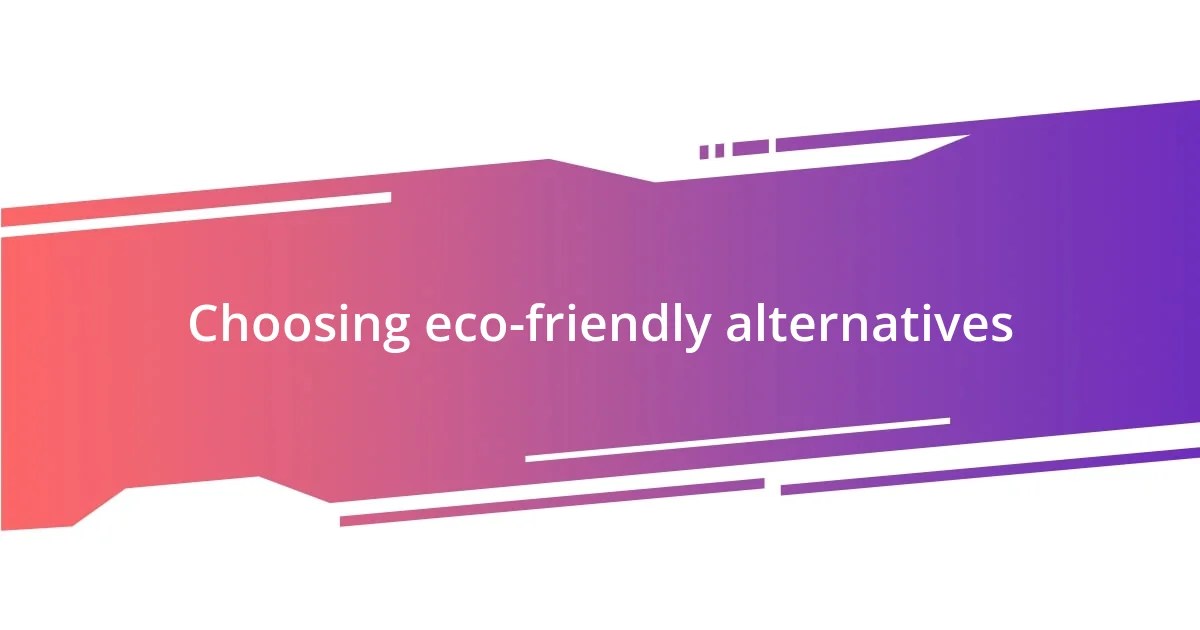
Choosing eco-friendly alternatives
Choosing eco-friendly alternatives is crucial for reducing plastic pollution. I remember the first time I decided to ditch plastic water bottles and invest in a reusable stainless-steel bottle. It wasn’t just about better hydration; it was about taking a stand against a throwaway culture. I felt proud every time I filled my bottle, knowing I was part of the solution rather than the problem. The emotional satisfaction of seeing fewer plastic bottles in the trash was exhilarating, and I realized how much my everyday choices could impact the environment.
Here are some eco-friendly alternatives I’ve embraced in my daily life:
- Beeswax Wraps: Instead of plastic wrap, I use beeswax wraps to store food. They’re colorful and keep my sandwiches fresh. Plus, they last a long time!
- Bamboo Toothbrushes: Switching to a bamboo toothbrush not only feels good in my hand, but I also love that it’s biodegradable. It gives me hope that I’m starting my day with a sustainable choice.
- Glass Containers: I’ve transitioned to glass storage containers for leftovers. They look great in my fridge and I know I’m keeping harmful plastics away from my food.
I’ve learned that making these choices doesn’t have to be a burden; it’s a journey. Each small swap builds momentum toward a more sustainable lifestyle, and the more I share my experiences, the more I inspire those around me. It’s all about finding what works for you and recognizing that each eco-friendly alternative contributes to reducing plastic pollution.
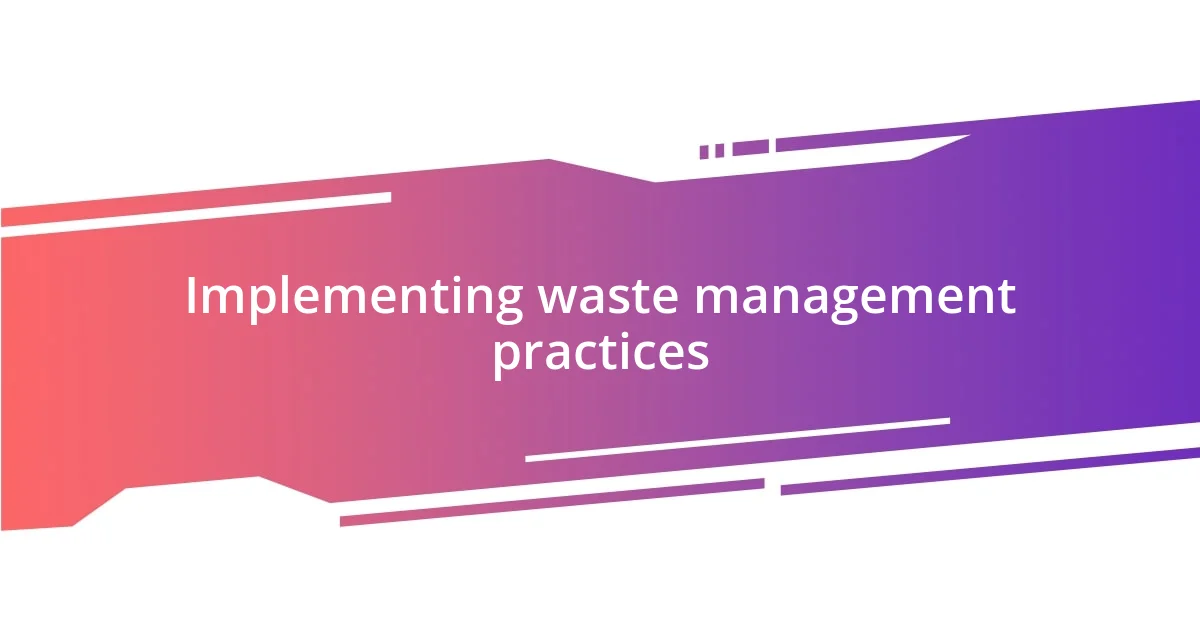
Implementing waste management practices
Implementing effective waste management practices plays a key role in minimizing plastic pollution. A memorable experience for me was when I participated in a community clean-up event. I was amazed at the sheer volume of plastic found along the shoreline. It made me realize how vital it is to not only clean up but also to change our habits surrounding waste disposal. How often do we think about where our trash actually ends up? Engaging in these clean-up efforts has deepened my appreciation for organized waste management.
I’ve also discovered the importance of proper recycling education. One day, while sorting through my recyclables, I felt a wave of confusion about what materials were truly recyclable. It struck me that many people share this uncertainty. I’ve taken it upon myself to learn the rules of our local recycling program and share that knowledge with friends and family. It’s incredible how spreading awareness can improve recycling rates and reduce contamination. When we all understand how to sort waste correctly, it empowers us to make informed decisions.
Lastly, composting has transformed my understanding of waste. I started a small compost bin in my kitchen, and it has been eye-opening to see how much organic waste can be diverted from landfills. Every time I add scraps to the bin, I feel a sense of accomplishment. Isn’t it rewarding to watch waste reduce while contributing to a healthier environment? It’s a small effort that yields significant benefits, reinforcing the idea that every little step counts in the fight against plastic pollution.
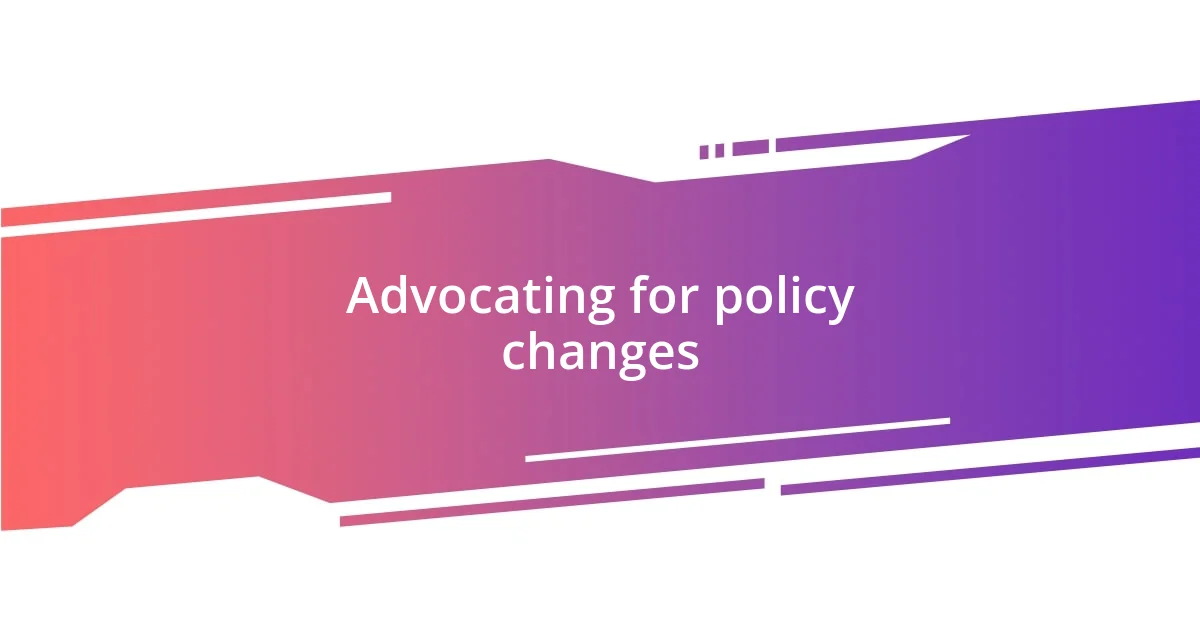
Advocating for policy changes
Advocating for policy changes is essential to combatting plastic pollution on a larger scale. I vividly recall attending a town hall meeting where local leaders discussed potential bans on single-use plastics. It struck me how passionate many people around me were, united by a common goal. When individuals band together, it amplifies our voices, demonstrating that collective action can lead to meaningful policy changes. Have you ever seen how a single voice can inspire others? Imagine the possibilities when that voice becomes part of a much larger chorus.
Engagement in advocacy doesn’t always require formal settings; sometimes, it can be as simple as starting conversations with friends. I shared my thoughts on plastic pollution over dinner with a group of friends, imagining how the conversation expanded our perspectives on local policies. I learned that many felt the same way yet didn’t understand how to act. This realization ignited a spark in me to not only advocate for change but to educate others about it as well. When we equip ourselves with knowledge, we empower our communities to push for policies that can effectively address plastic waste.
Participating in petitions is another straightforward way I advocate for change. The first time I signed a petition to reduce plastic use in my city, I felt an exhilarating sense of agency. It was as if I were casting a vote for the future I wanted to see. Each signature adds pressure on policymakers to take action, and when those efforts culminate in real legislation, the satisfaction is profound. It’s a reminder that even small actions—like signing a petition or sharing awareness on social media—can create ripples of change. Have you ever thought about how your voice could contribute to a larger movement? It’s an exhilarating feeling to realize that every action counts.
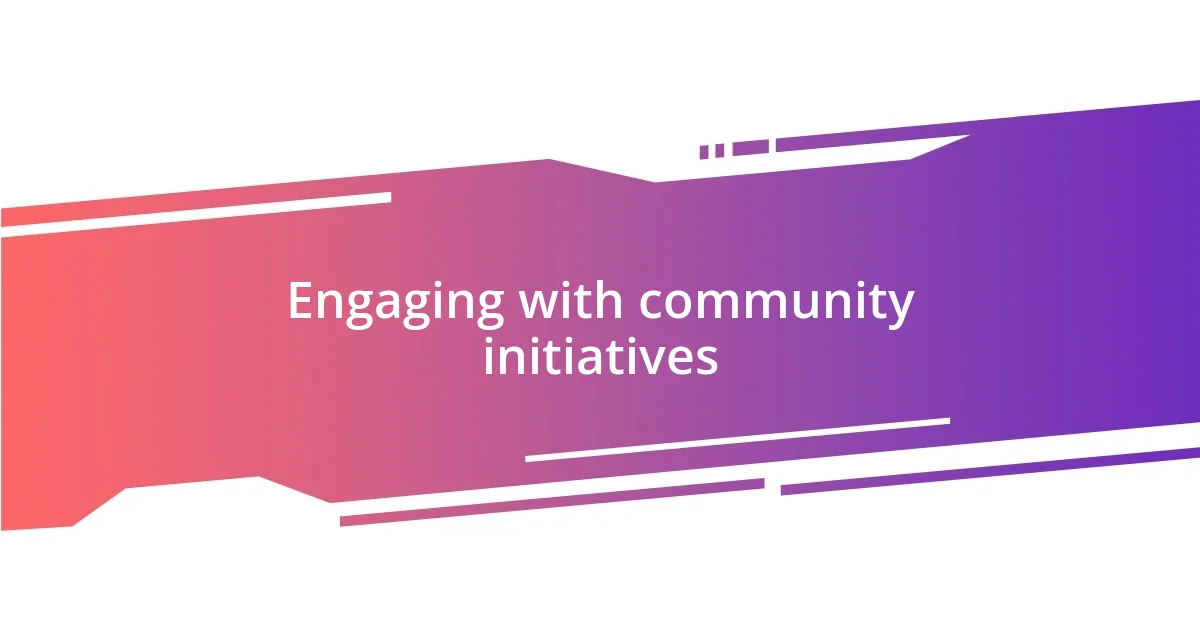
Engaging with community initiatives
Engaging with community initiatives has become a vital part of my journey in reducing plastic pollution. I remember attending a workshop organized by a local environmental group where we created reusable shopping bags from old t-shirts. Transforming what would have been waste into something practical was a real eye-opener for me. It sparked a sense of creativity and inspired me to find more ways to repurpose items, leading me to explore other DIY projects that reduce reliance on plastic. Have you ever taken something seemingly useless and turned it into something valuable?
Joining forces with my neighbors during a neighborhood recycling drive truly highlighted the importance of collective effort. As we gathered to sort recyclables, I found myself in deep conversations about the challenges we face in tackling plastic pollution. It struck me that sharing experiences and knowledge not only fosters camaraderie but also strengthens our resolve to make a difference together. Isn’t it amazing how a shared purpose can transform a routine task into a powerful movement?
I’ve also volunteered at local community events aimed at educating younger generations about the importance of reducing plastic waste. Watching children engage with interactive games about plastic pollution filled my heart with hope. Their curiosity and excitement reminded me that the future is bright if we equip our youth with the knowledge they need. Doesn’t it feel empowering to think that we can inspire the next generation to make smarter choices for the planet? Being part of these initiatives has reaffirmed my belief that every interaction can plant the seeds for change, leading to a more sustainable future.
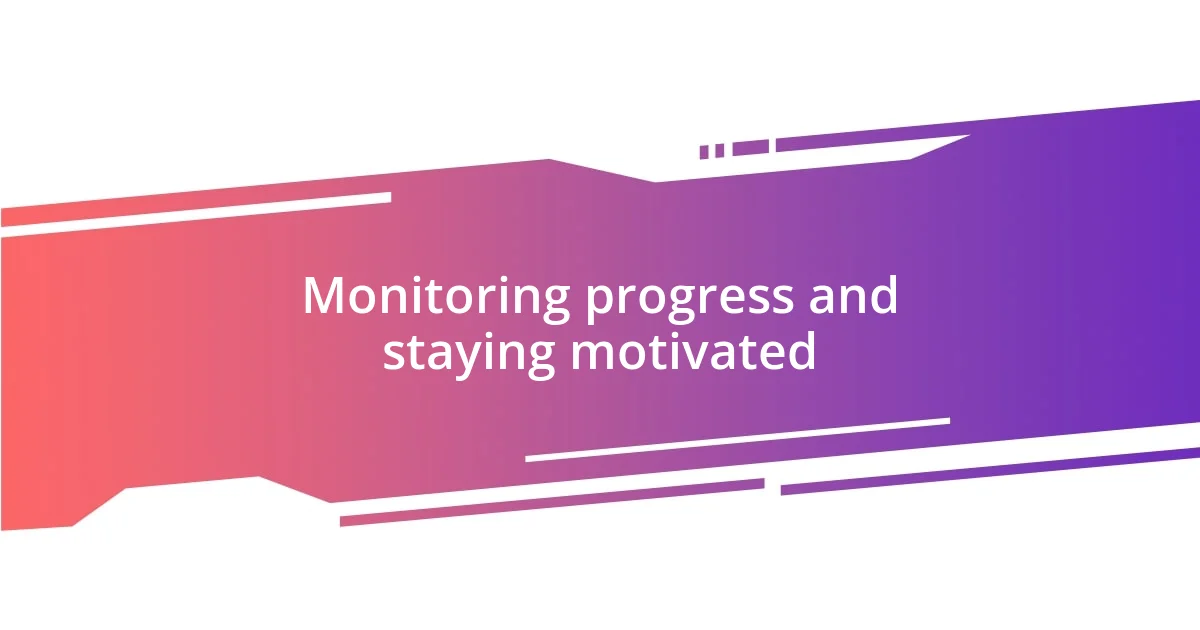
Monitoring progress and staying motivated
Tracking progress in reducing plastic pollution is something I find both motivating and necessary. I started keeping a journal to note down my personal plastic usage, and seeing these numbers gradually decline brought me a sense of accomplishment. Has that ever happened to you? When you can visually gauge your progress, it fuels the desire to push further toward your goals.
Staying motivated can feel daunting at times, especially when faced with the enormity of the pollution problem. One method I’ve adopted is creating small monthly challenges—like committing to a week without using single-use plastics. Sharing these experiences with friends through a group chat cultivates excitement and accountability. It’s a delightful buzz when others cheer you on. Don’t you love that feeling of camaraderie that arises from shared challenges?
I also find inspiration in community success stories. While browsing social media, I stumbled upon a local business that went completely plastic-free. Their journey filled me with hope and reminded me of the power of grassroots movements. How inspiring is it to know that change is possible? Reflecting on their success motivates me to redouble my efforts, reinforcing the belief that every step, no matter how small, contributes to the greater good.




